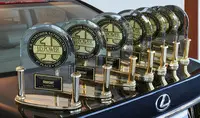J.D. Power and Associates Reports: Whole Foods, Toyota, General Motors, and Honda Capture the Largest Share of Positive Blogger Discussions
 |
WESTLAKE VILLAGE, Calif., Sept. 23, 2008 - Based on the analysis of 40 million blog posts collected during the past six months, in six major industries, four brands; Toyota, General Motors, Honda, garnered the greatest volume of positive conversation among online bloggers regarding environmental sustainability, according to the J.D. Power and Associates 2008 Environmental Sustainability Report released today. The six industries included in the report are discussed frequently in online conversations regarding eco-sustainability: automotive, retail, oil and gas, food and beverage, household products and utilities.
This report, conducted by the J.D. Power and Associates Web Intelligence Division (formerly Umbria, Inc.), which specializes in blog research and consumer-generated media research for market insight, is the first in a series to take a detailed look at consumer blogosphere conversations about environmental sustainability, global warming, purchase trends and user demographics. The report goes a step further to classify brands based on volume and percentage of positive mentions, and then to categorize those brands into four quadrants: pacesetters, contenders, emerging or challenged. Brands that receive less than 1 percent of the total number of online social media mentions within their respective industries are designated as dormant.
Consumers are showing rapidly increasing interest in environmental sustainability, both in their personal routines and in the brands that supply the products they buy, according to the inaugural study. There is a marked shift in the way consumers are discussing sustainability -- 62 percent of recent online posts were related to action-oriented solutions to environmental issues, a notable difference from 18 months ago when consumers were debating whether an environmental crisis even existed.
The report also finds that consumers are increasingly holding companies responsible for not only offering eco-friendly products, but also for acting in a sustainable manner. In addition, as consumers express feelings of uncertainty about how to effect environmental change on a personal level, they are also looking to the brands they use to provide information and clear direction.
"As more companies launch 'green' initiatives, consumers are becoming more skeptical and confused about what's real, what's not, and where they should focus their energy," said Janet Eden-Harris, vice president of the Web Intelligence Division at J.D. Power and Associates. "Brands that help consumers understand which products are and aren't green, and make it simple for customers to incorporate these products into their daily routines, will gain a major foothold in the sustainability conversation."
Consumers cite habit, convenience, price, and perceived loss of functionality as the challenges of "going green" in everyday life. Groups that indicate an interest in pursuing environmentally friendly lifestyles include parents adopting green habits to help provide for their children's future, as well as consumers generally looking to avoid social criticism and judgment for not adopting green practices.
"Consumers appreciate and often seek out positive social reinforcement surrounding the use of eco-friendly products and strategies in the home, and they desire for these aspects to be visible in some way," said Eden-Harris. "For the same reason, consumers are generally willing to spend more on more conspicuously sustainable purchases, such as hybrid cars."
"By tapping into spontaneous online conversations and gathering sustainability insights across several industries and topics -- from automotive to consumer packaged goods to energy -- we're providing brands with actionable insights into consumer motivations and behaviors that they wouldn't be able to access otherwise," said Chance Parker, vice president and general manager of the Web Intelligence Division at J.D. Power and Associates.


